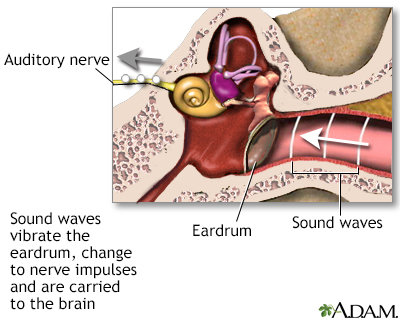Waardenburg syndrome
Definition
Waardenburg syndrome is a group of conditions passed down through families. The syndrome involves deafness and pale skin, hair, and eye color.
Alternative Names
Klein-Waardenburg syndrome; Waardenburg-Shah syndrome
Causes
Waardenburg syndrome is most often inherited as an autosomal dominant trait. This means only one parent has to pass on the faulty gene for a child to be affected.
There are four main types of Waardenburg syndrome. The most common are type I and type II.
Type III (Klein-Waardenburg syndrome) and type IV (Waardenburg-Shah syndrome) are rarer.
The multiple types of this syndrome result from defects in different genes. Most people with this disease have a parent with the disease, but the symptoms in the parent can be quite different from those in the child.
Symptoms
Symptoms may include:
- Cleft lip (rare)
- Constipation
- Deafness (more common in type II disease)
- Extremely pale blue eyes or eye colors that don't match (heterochromia)
- Pale color skin, hair, and eyes (partial albinism)
- Difficulty completely straightening joints
- Possible slight decrease in intellectual function
- Wide-set eyes (in type I)
- White patch of hair or early graying of the hair
Less common types of this disease may cause problems with the arms or intestines.
Treatment
There is no specific treatment. Symptoms will be treated as needed. Special diets and medicines to keep the bowel moving are prescribed to those people who have constipation. Hearing should be checked closely.
Outlook (Prognosis)
Once hearing problems are addressed, most people with this syndrome should be able to lead a normal life. Those with rarer forms of the syndrome may have other complications.
Possible Complications
Complications may include:
- Constipation severe enough to require part of large bowel to be removed
- Hearing loss
- Self-esteem problems, or other problems related to appearance
- Slight decreased intellectual functioning (possible, unusual)
When to Contact a Medical Professional
Genetic counseling may be helpful if you have a family history of Waardenburg syndrome and plan to have children. Contact your health care provider for a hearing test if you or your child has deafness or decreased hearing.
Gallery


References
Cipriano SD, Zone JJ. Neurocutaneous disease. In: Callen JP, Jorizzo JL, Zone JJ, Piette WW, Rosenbach MA, Vleugels RA, eds. Dermatological Signs of Systemic Disease. 5th ed. Philadelphia, PA: Elsevier; 2017:chap 40.
Kliegman RM, St. Geme JW, Blum NJ, Shah SS, Tasker RC, Wilson KM. Defects in metabolism of amino acids. In: Kliegman RM, St. Geme JW, Blum NJ, Shah SS, Tasker RC, Wilson KM, eds. Nelson Textbook of Pediatrics. 21st ed. Philadelphia, PA: Elsevier; 2020:chap 103.
Milunsky JM. Waardenburg syndrome type I. GeneReviews [Internet]. 2017. PMID: 20301703 pubmed.ncbi.nlm.nih.gov/20301703/. Updated May 4, 2017. Accessed October 29, 2021.